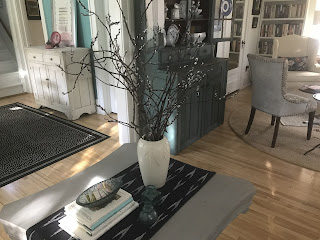 "Vote your conscience." That statement was made many times during the impeachment trial last week, and each time I heard it I hoped that would happen.
"Vote your conscience." That statement was made many times during the impeachment trial last week, and each time I heard it I hoped that would happen.
In my view, voting one's conscience in this case meant voting to convict the former president. To vote otherwise, I felt, would be to deny the truth.
How can they sleep at night? How can they look themselves in the mirror? How can they face their children, grandchildren?
What is the future they are creating?
The outcome of the vote on Saturday was not surprising, but even so the reality of it was and remains upsetting. For many of us the words repeated over and over leading up to January 6 and the ugly and frightening videos of that day will not disappear. How does one go on with business as usual now?
Don't they have a conscience?
I am re-reading all of Louise Penny's wonderful mysteries, and I love them even more this second time around. Not only does the murder case in each book still intrigue me, but the characters offer so much wisdom about living compassionate and loving lives; lives, not always easy, but ones reaching towards integrity and authenticity.
How amazed I was when I read this section in Glass Houses after checking my phone for the results of the vote. In a discussion about the archangels Michael and Lucifer, Ruth, one of the ongoing characters in the series, a poet and often viewed as crazy says,
"Well, I start off praying that anyone who's pissed me off meets
a horrible end, Then I pray for world peace, and then I pray for
Lucifer."
"Did you say Lucifer?" asked Myrna.
"Who needs it more?"
And then Ruth talks about conscience.
"Stupid, stupid angel...It's generally thought that a conscience
is a good thing, but let me ask you this. How many terrible
things are done in the name of conscience? It's a great excuse
for appalling acts?... A conscience is not necessarily a good
thing. How many gays are beaten, how many abortion clinics
bombed, how many blacks lynched, how many Jews
murdered, by people just following their conscience?
Myrna, a black woman, and former psychotherapist who owns a book store in the small community, says,
"A conscience guides us...To do the right thing. To be brave.
To be selfless and courageous. To stand up to tyrants whatever
the cost."
I suppose all who cast their votes on Saturday feel they voted their conscience, and I suspect many who stormed the capital felt they were doing what needed to be done. I wonder, however, what the deep, small, quiet voice inside is whispering to them--if they could only listen. If they could only sit in stillness, in silence.
Here's the deal: What happened Saturday in the Senate is not just about "they" and their consciences. (And, oh how aware I am of the "they" language, the reference to "other" I am using. Ouch!) I need to stay in close contact with my own conscience, my own still, small voice inside. I need to nurture it and clear it of mean and judgmental thoughts. I need to wash it in love and compassion and hope. I need to strengthen its ability to guide me to do the right thing. I need to awaken and stay awake to the presence of God in my life and I need to be that presence.
And that is no small task. May we know the presence of God in one another.
Thanks to Interfaith Action of St Paul for offering prayers by local clergy for a country in need. Here's one:
Our God, and God of our ancestors
And God of our descendants, in these incessant
days of challenge, I need you.
Steady my breaths.
Quell my worries.
Calm my anger.
Alleviate my sadness.
Allow my mind and heart to trust
That decency, law, and reason will abide.
Help me find the strength to
Protect myself and all people against racism,
antisemitism, islamophobia, and all hatred of
the other.
Open my eyes to see the good in our
time and give me the ability to nurture that
good in others.
And, please God, may I experience
living in an America where all feel safe, our
democracy is sanctified and streets peaceful, and
all shall sit under their own vine and fig tree, and
no one shall make them afraid.
Amen.
--Adam Stock Spilker, Rabbi,
Mt Zion Temple
You can read the rest of the prayers here.
 Back to reading. I only have three more Louise Penny books left, and then I wait till August when #17 is published.
Back to reading. I only have three more Louise Penny books left, and then I wait till August when #17 is published.
An Invitation
Where do you see and know the presence of God? I would love to know.












